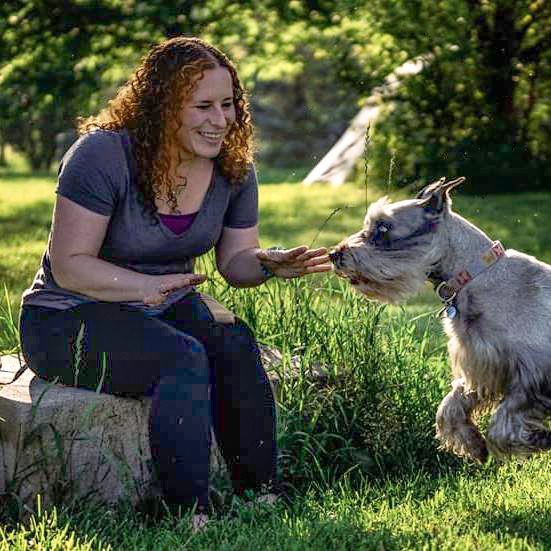A Personal Story of Spreading Joy and Enhancing Resident Quality of Life through Pet Therapy
By Jessica Katz, Resident Services and Community Outreach Manager
In 2005, I began bringing rescued greyhounds to elder care facilities in rural Franklin County, Vermont as a part of a college volunteer program- Pets Helping People. These dogs ranged from energetic and outgoing to anxious and withdrawn depending on how their experiences on the racetrack had shaped them. My greyhound of the day and I would chat with residents of memory care, skilled nursing, and subacute rehabilitation units across 3 different facilities on a weekly basis, and it was something I always looked forward to. Regardless of the type of facility or floor we visited, the response to these lean pups was the same- excitement, heightened alertness, and engagement from the residents. When I became the program coordinator for Pets Helping People, I would assign as many as 20 college kids and 10 greyhounds to these facilities, and the reception was always warm and joyful.
Peer-reviewed research dating back to the early 2000s has shown that therapeutic practices by animal care teams can reduce anxiety and sadness and result in higher alertness in Alzheimer’s patients, and improve self-esteem, self-determination, and a reduction of symptoms in schizophrenia patients. People recovering from chronic heart failure were three times more likely to walk twice the distance when partnered with a therapy dog in physical therapy. Children exhibited less fear before dentist appointments when given the opportunity to interact therapeutically with an animal, and kids with developmental disorders respond by becoming more self-aware and more playful in the presence of a therapy dog.
From 2017 until the beginning of the pandemic I had the great fortune of bringing Libby, my standard schnauzer, to visit with residents at The Selfhelp Home. We were a certified therapy dog team and our visits to residents here in Chicago were always joyful. We’d come by after lunch and sit with people in the lobby, under the warm supervision of our concierge Tom Samolinski. We would schmooze until Libby fell asleep on someone’s feet, and then it was time to leave. When I would visit, there was also a resident named Libby, and Libby & Libby were a matched pair of kindness.
During one of my visits a resident asked me, “Does she bark often?”
I explained that she barks when she tries to tell me that she needs something.
Then I asked the resident if she understood what Libby says when she barks.
The resident had a ready answer: “Libby is a schnauzer, and schnauzers are German dogs. Selfhelp is a German facility, and I am German. I know Libby is a nice Jewish dog, and the reason you don’t understand her is because she’s barking in Yiddish- and you don’t speak Yiddish!” I still laugh when I think about that conversation.
Any opportunity to bring animals to The Selfhelp Home reminds me of Libby, who passed away at the age of 14 in 2020. As the founder and executive director of Chicagoland Exotic Animal Rescue (CLEAR), I’m particularly grateful for the organization’s benevolence as it pertains to the presence of parakeets in the lobby and Carpas the Tortoise who lived in the Bensinger Room recetly until he was quickly adopted by a resident’s family. Residents loved watching Tortoise TV, and always asked thoughtful questions whenever I was providing care for our animal population. Pets provide an opportunity for engagement across generations- grandchildren love visiting with their relatives in front of Taylor and Swift the parakeets, and grandparents take pride in being able to tell the kids about these special residents. I was thrilled when one of our residents adopted a canary from CLEAR, it was the perfect mesh between Selfhelp and CLEAR, and Nimbus the Canary continues to brighten his human’s days.
Selfhelp also welcomes therapy dog volunteers from throughout the community, including individual therapy dog teams and monthly visits from JUF TOV volunteers and the JUF Women’s Board. Enthusiastic puppies and their pet parents always bring a spark of excitement to the lobby, and residents across the facility eagerly reach out to stroke soft fur and ask about a dog’s age, breed, and personality.
I count my blessings on a daily basis- that my volunteer time before the pandemic with Libby led to the opportunity to join the team at The Selfhelp Home, and that I get to share my love of animals with our residents. Libby was a rather reserved dog, but when we parked in the lot on a Saturday afternoon and I put her therapy dog bandana on, she knew it was time to get to work brightening peoples’ days. I try to emulate that eagerness daily.
10 Benefits of Pet Therapy for Seniors
Pet therapy can be particularly beneficial for seniors, offering a range of physical, emotional, and social advantages tailored to their unique needs:
Companionship: Many seniors experience feelings of loneliness and isolation, especially if they live alone or have limited social interactions. Pets provide constant companionship and unconditional love, offering seniors a source of comfort and emotional support.
Mood Enhancement: Interacting with pets can uplift seniors’ mood and alleviate symptoms of depression and anxiety. The presence of a furry friend can bring joy, laughter, and a sense of purpose to their daily lives, combating feelings of sadness or despair.
Stress Reduction: Petting or cuddling with animals has a calming effect on the nervous system, reducing stress levels and promoting relaxation. For seniors dealing with the challenges of aging, pet therapy can provide a welcome respite from worries and tension.
Physical Activity: Owning a pet encourages seniors to stay active by engaging in activities like walking, playing, and grooming. Regular physical exercise is essential for maintaining mobility, strength, and cardiovascular health, helping seniors stay fit and independent for longer.
Lower Blood Pressure: Studies have shown that interacting with animals can lead to lower blood pressure levels in seniors. Petting a dog or cat, for example, can have a therapeutic effect on the cardiovascular system, reducing the risk of hypertension and related health problems.
Improved Cognitive Function: Engaging with pets stimulates seniors’ cognitive abilities, keeping their minds sharp and active. Activities like teaching tricks to a dog or solving puzzles with a pet can enhance memory, problem-solving skills, and overall cognitive function.
Social Interaction: Pets serve as social facilitators, encouraging seniors to connect with others in their community. Whether it’s chatting with fellow pet owners during walks or participating in pet-related events, owning a pet can foster meaningful social connections and combat feelings of loneliness.
Sense of Purpose: Caring for a pet gives seniors a sense of responsibility and purpose, providing structure and routine to their daily lives. The bond formed between seniors and their pets nurtures a sense of fulfillment and meaning, contributing to overall well-being.
Pain Management: Pet therapy has been shown to alleviate pain and discomfort in seniors, particularly those dealing with chronic conditions such as arthritis or fibromyalgia. The distraction and comfort provided by interacting with animals can help reduce pain perception and improve quality of life.
Emotional Support: Pets offer unwavering emotional support to seniors during difficult times, such as illness, loss, or transition to assisted living facilities. The presence of a beloved pet can provide solace, empathy, and a sense of security, easing emotional distress and promoting resilience.
Pet therapy offers a multitude of benefits for seniors, encompassing physical health, emotional well-being, and social connection. By nurturing relationships with their furry companions, seniors can enjoy a higher quality of life and age with grace and vitality.
Jessica Katz is the Resident Services and Community Outreach Manager at The Selfhelp Home, she regularly coordinates animal volunteers from TOV with JUF to visit residents. Before becoming a staff member she was a volunteer who would regularly bring Libby, her Standard Schnauzer, to visit with residents. Jessica is also the founder and executive director of Chicagoland Exotic Animal Rescue (CLEAR) a state-licensed nonprofit exotic animal rescue. The Selfhelp Home is a foster home to some of CLEAR rescue animals including parakeets Taylor and Swift and until very recently – Carpas, a Russian tortoise. Taylor and Swift are available for adoption through CLEAR.
* * * * *
To learn more about what it’s like to be a resident at The Selfhelp Home and other resident engagement activities offered at The Selfhelp Home in Chicago, contact us.
The Selfhelp Home
Ph: 773.271.0300
Email: [email protected]
Photo: Jessica Katz with her pup.


